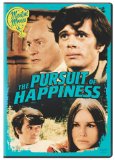| Reviews & Columns |
|
Reviews DVD TV on DVD Blu-ray 4K UHD International DVDs In Theaters Reviews by Studio Video Games Features Collector Series DVDs Easter Egg Database Interviews DVD Talk Radio Feature Articles Columns Anime Talk DVD Savant Horror DVDs The M.O.D. Squad Art House HD Talk Silent DVD
|
DVD Talk Forum |
|
|
| Resources |
|
DVD Price Search Customer Service #'s RCE Info Links |
|
Columns
|
|
|
Pursuit of Happiness (1971), The
I ranted more fully about Sony's bogus Martini Movies brand in my review of Summertree, the other Vietnam-era youth picture I'm reviewing this week, but suffice it to say: there is nothing remotely "martini" or "swinging" or "camp" or "iconic" or any of the other b.s. marketing buzzwords Sony plastered on the DVD case, about The Pursuit of Happiness, the 1970 Robert Mulligan-directed...drama (?) starring Michael Sarrazin, Barbara Hershey and E.G. Marshall. Laid-back to the point of catatonia, and deliberately obtuse without being at least interesting, dull-as-dishwater The Pursuit of Happiness makes Summertree look like a work of art by comparison.
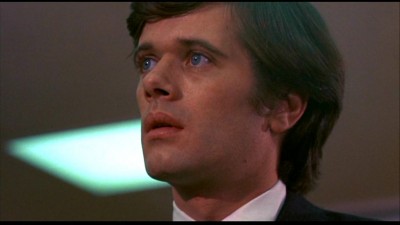
It's the height of the madness in the streets of 1970 New York City as blown-out former campus radical (and scion of a wealthy family) William Popper (Michael Sarrazin) sails his toy boat on a pond in Central Park. Not at all interested in joining his girlfriend Jane Kauffman (Barbara Hershey) at a political rally, he entertains a visit from his Aunt Ruth (Sada Thompson), who worries that William is "getting off track" (and who is scandalized when she sees gorgeously-naked Jane come out of William's shower). Wishing to see his father, John (Arthur Hill), who apparently has rejected the call of the Popper family to be wealthy movers and shakers by living out in the country to paint, William heads out into the rainy night in his fashionably beat-up/expensive sports car...and promptly smacks into an old woman crossing the street between two parked cars. William's license is expired, and his brakes are gone, and it looks like he may be in serious trouble, so John calls his brother-in-law, Daniel Lawrence (E.G. Marshall), a cold, calculating, influential lawyer who immediately plots out William's "escape" from justice - an escape William increasingly doesn't want. Soon, William is off to prison, where a series of further misadventures make him question his very role in the American society he can no longer tolerate.
MAJOR SPOILERS ALERT!
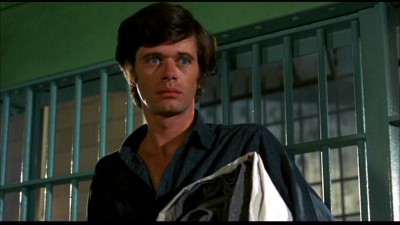
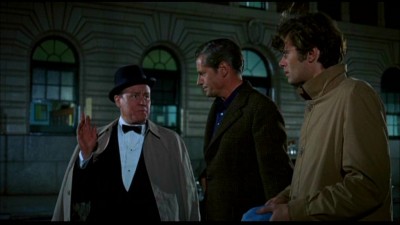
I'm now probably in the minority of critics who feel that director Robert Mulligan was at best, overrated, but during his career, it was much more acceptable to question his efforts, prior to his now virtual canonization over the equally overrated To Kill a Mockingbird. And certainly, films like The Pursuit of Happiness have to make one wonder how Mulligan captured this rep as a quiet, anonymous genius who turned out classics the public and the critics didn't always "get." A film of almost supernatural indifference (and yes, I understand that may been the intent of the film's message, but that doesn't mean the movie itself has to just lay there and die), The Pursuit of Happiness isn't good, and it isn't bad, and it isn't inbetween: it's just...nothing.
And "nothing" pretty much sums up The Pursuit of Happiness biggest drawback (just like in Summertree): its lead character. Only in The Pursuit of Happiness, Sarrazin's William Popper makes Michael Douglas' indecisive Jerry look like G.I. Joe and Action Man rolled into one. Watching The Pursuit of Happiness, one can see where Mulligan and his screenwriters could have turned the story into a massive dead-pan, sick-joke movie, highlighting the increasing calamities that befall their befuddled patrician bumpkin hero in a satirical swipe at the day's politics, a la Thackeray. The film has the ingredients for a such a movie, even it they're presented in a lumpen, obvious manner. William, the descendant of an old-money Protestant family of by-gone influence, sees the ironies of the rich versus the poor, the enlightened versus the bigoted (both contradictions present in the grandmother character, played by Ruth White), and yet...he can offer up no resistence or even comment on them. He's given up caring - even for himself - as he walks anesthetized through life, sailing his little toy boat - a case of an actor perfectly matching the character, since Sarrazin does here what he always does in his films: stand there in an uncomprehending fugue-state, his cow eyes dolefully looking out, waiting passively for the hammer blow. One could do something with that premise, using the cipher William Popper as a conduit to comment on the present sick society at large.
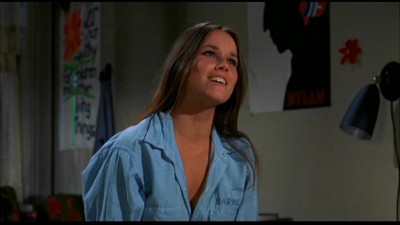
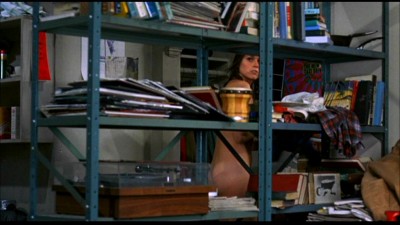
But as one watches The Pursuit of Happiness, one gets the sinking feeling that the filmmakers actually believe William is a viable hero, and an answer to the times. In a series of absurdist coincidences, William finds himself falling further and further away from the norms of society until he's contemplating leaving the country. But it's impossible for the viewer to feel any more involved with William's plight than it appears for William himself to do so, because the film resolutely refuses to comment one way or the other on his actions. And if we have to make up our own minds about this genuine cipher, how can the viewer summon up anything but contempt for a character who shows more passion about refusing to wear a suit into court - because that would be kowtowing to the Establishment - than he does for the poor woman he accidentally runs over? He states quite clearly her death was an accident, and he feels absolutely no guilt over her death. And when his friend George Wilson (Gilbert Lewis) in prison dies in a knife attack, William's same doe-eyed blankness excuses away the deed by saying again it was an accident: his friend fell on the knife. No harm, no foul (he even provides an excuse for George's killer).
Now, if The Pursuit of Happiness wanted to include William's disengagement from society as part of the problem - then fine. Don't comment on his actions. We'll figure out he has a hand in the "nervous breakdown" going on out there, as William describes it, as the rest of society. His blankness could be portrayed as a symptom of that sick society. But clearly, Mulligan and the screenwriters want us to admire what William is doing at the end of the film - escaping to Mexico - because he successfully takes along activist Jane. Probably the only positive character in the film (and unfortunately, even more undeveloped than the other nonentities in the film), Jane's final decision to go with William validates his action as a viable alternative to staying and fighting against the Establishment. Suddenly, a film that clumsily tried to build some kind of quixotic, absurdist daytime nightmare about a blank innocent stumbling through an insane society, turns around and says: the answer is leaving. If you have money, and you don't care anymore about anything, leave the country. As William and Jane leave New York City airspace in William Devane's plane (again - a terrific actor who brings tantalizing suggestions to an underwritten part), Randy Newman's whiney song about not "wanting to know," and being "too young" wells up on the soundtrack again, and we're supposed to see this act how? As a triumph? What kind of counterculture triumph is that? That's the answer to society's "nervous breakdown?" Should we all leave, and the last one out turns off the lights? Works fine if you have dough, but I would imagine the few college kids who saw this film might lump William in with the film's other fat cat, Daniel, and his method of doing things: when things get rough, buy your way out of trouble. And when the film abruptly ends on this image of the plane flying past the Statue of Liberty, William's and Jane's gesture feels selfish, and ultimately, empty. Just like the rest of the film.
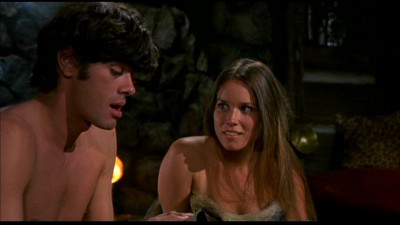
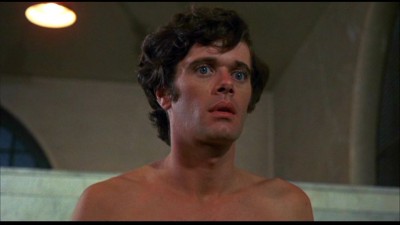
The DVD
The Video
As with the other bogus Sony Martini Movie I reviewed this week, Summertree, The Pursuit of Happiness looks brand-new in an almost blemish-free, anamorphically-enhanced, 1.85:1 widescreen transfer. Colors are beautifully modulated (the New York City location work is excellent), and the image is sharp (with only minimal grain, as expected). No compression issues, either. It's a good-looking film, if nothing else.
The Audio
The Dolby Digital English mono audio track is entirely in keeping with this largely dialogue-driven film. All words are heard crisply and cleanly, and hiss is at a minimum. English subtitles and close-captions are included, as well.
The Extras
There are some trailers for Sony DVD collections included with the original theatrical trailer for The Pursuit of Happiness (which is just as inscrutable as the feature).
Final Thoughts
A truly useless film. Not nearly meaningful enough to transcend its dated trappings, and sporting a cipher of a lead character whose most meaningful act in the film is not mourning the death of a woman he accidentally kills, but protesting the wearing of a suit...which he winds up doing, anyway. This is drama? Michael Sarrazin is hopeless, while the rest of the cast has literally nothing to do (although Barbara Hershey, predictably, gets naked...thank god). A total cop-out. You can safely skip The Pursuit of Happiness.
Paul Mavis is an internationally published film and television historian, a member of the Online Film Critics Society, and the author of The Espionage Filmography.


|
| Popular Reviews |
| Sponsored Links |
|
|
| Sponsored Links |
|
|
| Release List | Reviews | Shop | Newsletter | Forum | DVD Giveaways | Blu-Ray | Advertise |
|
Copyright 2024 DVDTalk.com All Rights Reserved. Legal Info, Privacy Policy, Terms of Use,
Manage Preferences,
Your Privacy Choices | |||||||









